Sociology and Social Science: The Role of Family in Society and Change
VerifiedAdded on 2021/04/17
|6
|1459
|102
Essay
AI Summary
This sociology essay examines the family as the primary agent of socialization, emphasizing its crucial role in shaping individual personalities and teaching societal norms. It analyzes the dramatic changes in American families over the past fifty years, attributing them to factors like contraception, women's education, and scientific advancements. The essay further explores how class, race, gender, and personal choices influence marriage and family life, highlighting disparities and evolving trends. It also discusses the trend toward diverse family structures, framing it as a positive adaptation, and considers the potential negative impacts on women's rights if societal trends reverted to traditional pre-World War II family structures. The essay uses several scholarly references to support its arguments.
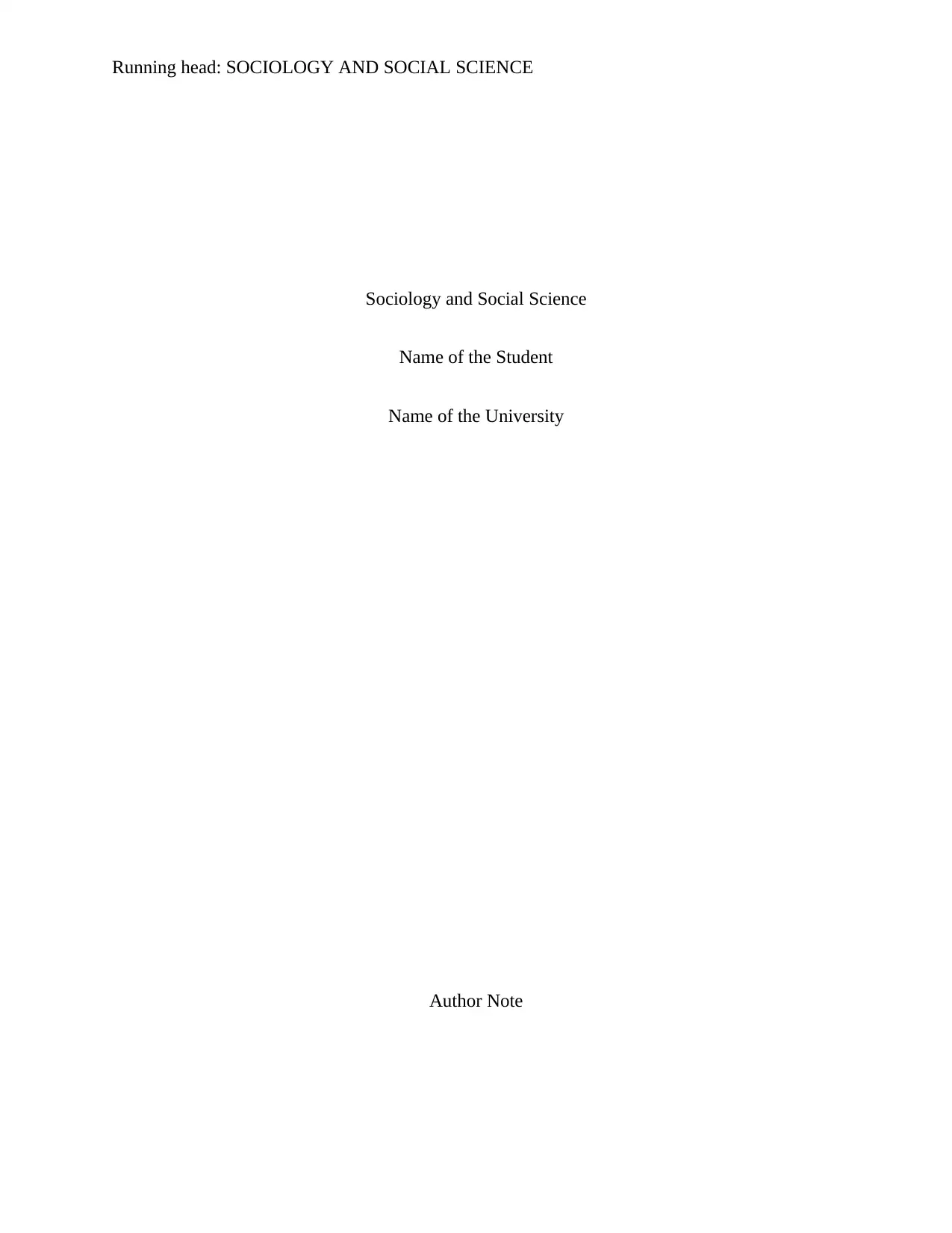
Running head: SOCIOLOGY AND SOCIAL SCIENCE
Sociology and Social Science
Name of the Student
Name of the University
Author Note
Sociology and Social Science
Name of the Student
Name of the University
Author Note
Paraphrase This Document
Need a fresh take? Get an instant paraphrase of this document with our AI Paraphraser
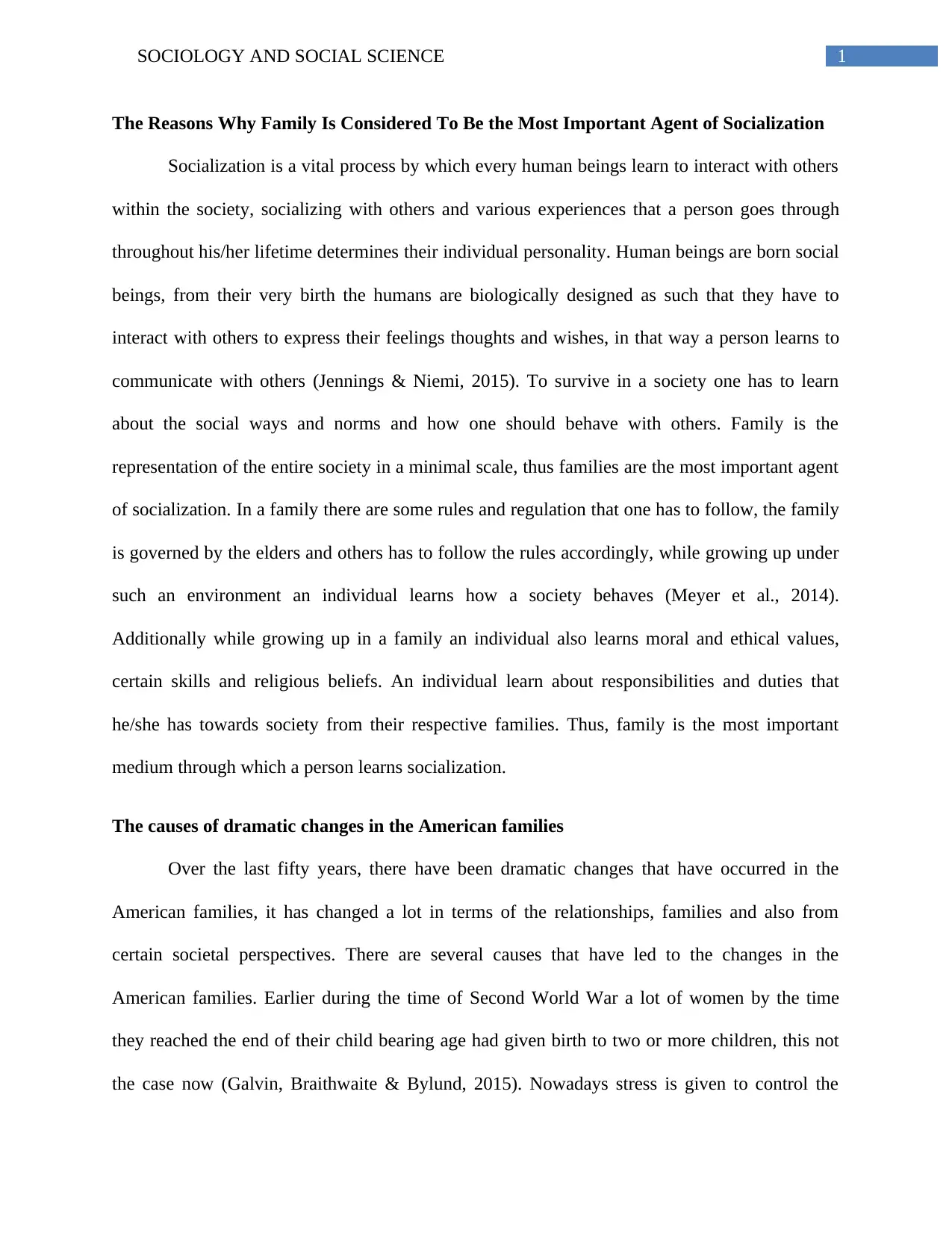
1SOCIOLOGY AND SOCIAL SCIENCE
The Reasons Why Family Is Considered To Be the Most Important Agent of Socialization
Socialization is a vital process by which every human beings learn to interact with others
within the society, socializing with others and various experiences that a person goes through
throughout his/her lifetime determines their individual personality. Human beings are born social
beings, from their very birth the humans are biologically designed as such that they have to
interact with others to express their feelings thoughts and wishes, in that way a person learns to
communicate with others (Jennings & Niemi, 2015). To survive in a society one has to learn
about the social ways and norms and how one should behave with others. Family is the
representation of the entire society in a minimal scale, thus families are the most important agent
of socialization. In a family there are some rules and regulation that one has to follow, the family
is governed by the elders and others has to follow the rules accordingly, while growing up under
such an environment an individual learns how a society behaves (Meyer et al., 2014).
Additionally while growing up in a family an individual also learns moral and ethical values,
certain skills and religious beliefs. An individual learn about responsibilities and duties that
he/she has towards society from their respective families. Thus, family is the most important
medium through which a person learns socialization.
The causes of dramatic changes in the American families
Over the last fifty years, there have been dramatic changes that have occurred in the
American families, it has changed a lot in terms of the relationships, families and also from
certain societal perspectives. There are several causes that have led to the changes in the
American families. Earlier during the time of Second World War a lot of women by the time
they reached the end of their child bearing age had given birth to two or more children, this not
the case now (Galvin, Braithwaite & Bylund, 2015). Nowadays stress is given to control the
The Reasons Why Family Is Considered To Be the Most Important Agent of Socialization
Socialization is a vital process by which every human beings learn to interact with others
within the society, socializing with others and various experiences that a person goes through
throughout his/her lifetime determines their individual personality. Human beings are born social
beings, from their very birth the humans are biologically designed as such that they have to
interact with others to express their feelings thoughts and wishes, in that way a person learns to
communicate with others (Jennings & Niemi, 2015). To survive in a society one has to learn
about the social ways and norms and how one should behave with others. Family is the
representation of the entire society in a minimal scale, thus families are the most important agent
of socialization. In a family there are some rules and regulation that one has to follow, the family
is governed by the elders and others has to follow the rules accordingly, while growing up under
such an environment an individual learns how a society behaves (Meyer et al., 2014).
Additionally while growing up in a family an individual also learns moral and ethical values,
certain skills and religious beliefs. An individual learn about responsibilities and duties that
he/she has towards society from their respective families. Thus, family is the most important
medium through which a person learns socialization.
The causes of dramatic changes in the American families
Over the last fifty years, there have been dramatic changes that have occurred in the
American families, it has changed a lot in terms of the relationships, families and also from
certain societal perspectives. There are several causes that have led to the changes in the
American families. Earlier during the time of Second World War a lot of women by the time
they reached the end of their child bearing age had given birth to two or more children, this not
the case now (Galvin, Braithwaite & Bylund, 2015). Nowadays stress is given to control the
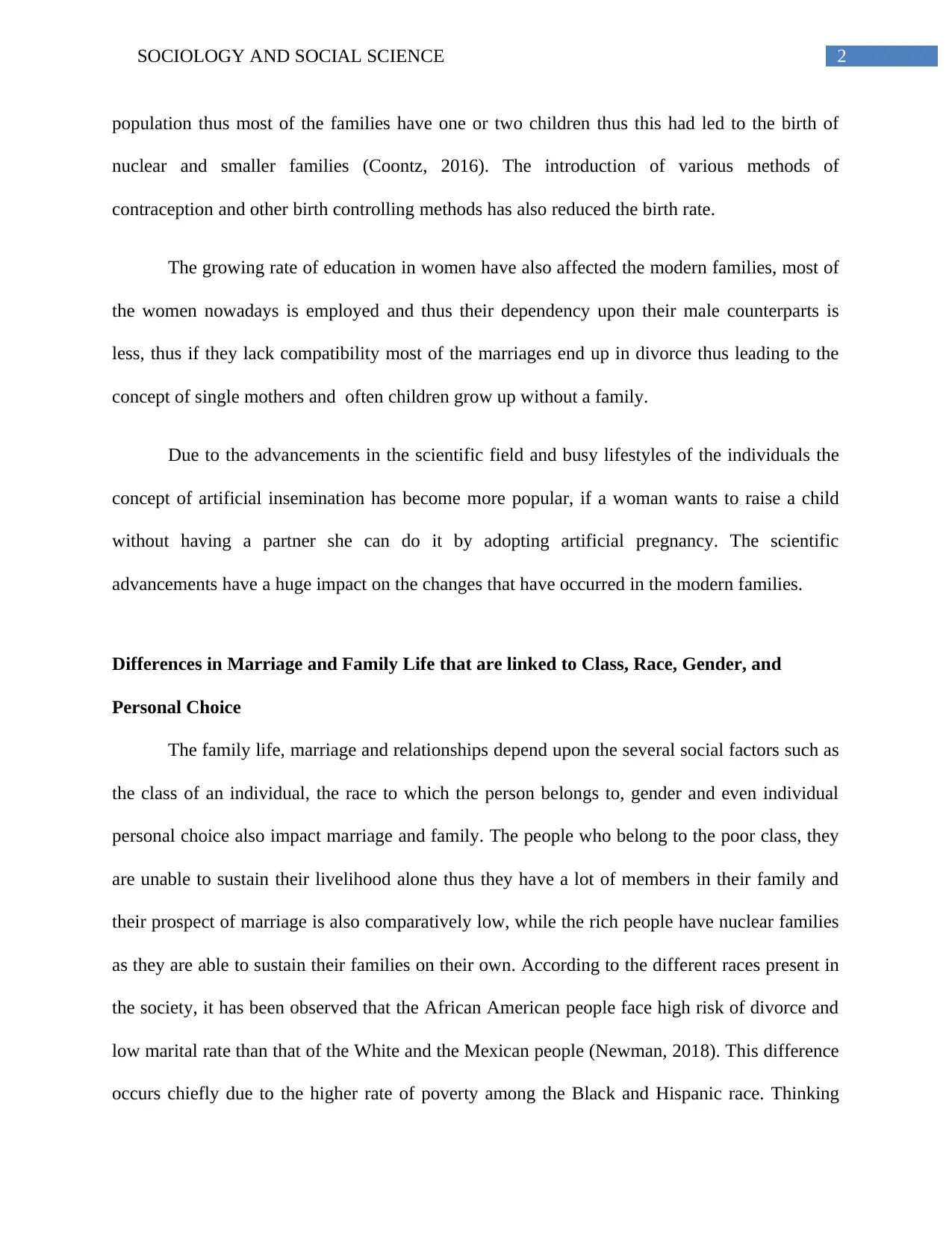
2SOCIOLOGY AND SOCIAL SCIENCE
population thus most of the families have one or two children thus this had led to the birth of
nuclear and smaller families (Coontz, 2016). The introduction of various methods of
contraception and other birth controlling methods has also reduced the birth rate.
The growing rate of education in women have also affected the modern families, most of
the women nowadays is employed and thus their dependency upon their male counterparts is
less, thus if they lack compatibility most of the marriages end up in divorce thus leading to the
concept of single mothers and often children grow up without a family.
Due to the advancements in the scientific field and busy lifestyles of the individuals the
concept of artificial insemination has become more popular, if a woman wants to raise a child
without having a partner she can do it by adopting artificial pregnancy. The scientific
advancements have a huge impact on the changes that have occurred in the modern families.
Differences in Marriage and Family Life that are linked to Class, Race, Gender, and
Personal Choice
The family life, marriage and relationships depend upon the several social factors such as
the class of an individual, the race to which the person belongs to, gender and even individual
personal choice also impact marriage and family. The people who belong to the poor class, they
are unable to sustain their livelihood alone thus they have a lot of members in their family and
their prospect of marriage is also comparatively low, while the rich people have nuclear families
as they are able to sustain their families on their own. According to the different races present in
the society, it has been observed that the African American people face high risk of divorce and
low marital rate than that of the White and the Mexican people (Newman, 2018). This difference
occurs chiefly due to the higher rate of poverty among the Black and Hispanic race. Thinking
population thus most of the families have one or two children thus this had led to the birth of
nuclear and smaller families (Coontz, 2016). The introduction of various methods of
contraception and other birth controlling methods has also reduced the birth rate.
The growing rate of education in women have also affected the modern families, most of
the women nowadays is employed and thus their dependency upon their male counterparts is
less, thus if they lack compatibility most of the marriages end up in divorce thus leading to the
concept of single mothers and often children grow up without a family.
Due to the advancements in the scientific field and busy lifestyles of the individuals the
concept of artificial insemination has become more popular, if a woman wants to raise a child
without having a partner she can do it by adopting artificial pregnancy. The scientific
advancements have a huge impact on the changes that have occurred in the modern families.
Differences in Marriage and Family Life that are linked to Class, Race, Gender, and
Personal Choice
The family life, marriage and relationships depend upon the several social factors such as
the class of an individual, the race to which the person belongs to, gender and even individual
personal choice also impact marriage and family. The people who belong to the poor class, they
are unable to sustain their livelihood alone thus they have a lot of members in their family and
their prospect of marriage is also comparatively low, while the rich people have nuclear families
as they are able to sustain their families on their own. According to the different races present in
the society, it has been observed that the African American people face high risk of divorce and
low marital rate than that of the White and the Mexican people (Newman, 2018). This difference
occurs chiefly due to the higher rate of poverty among the Black and Hispanic race. Thinking
⊘ This is a preview!⊘
Do you want full access?
Subscribe today to unlock all pages.

Trusted by 1+ million students worldwide
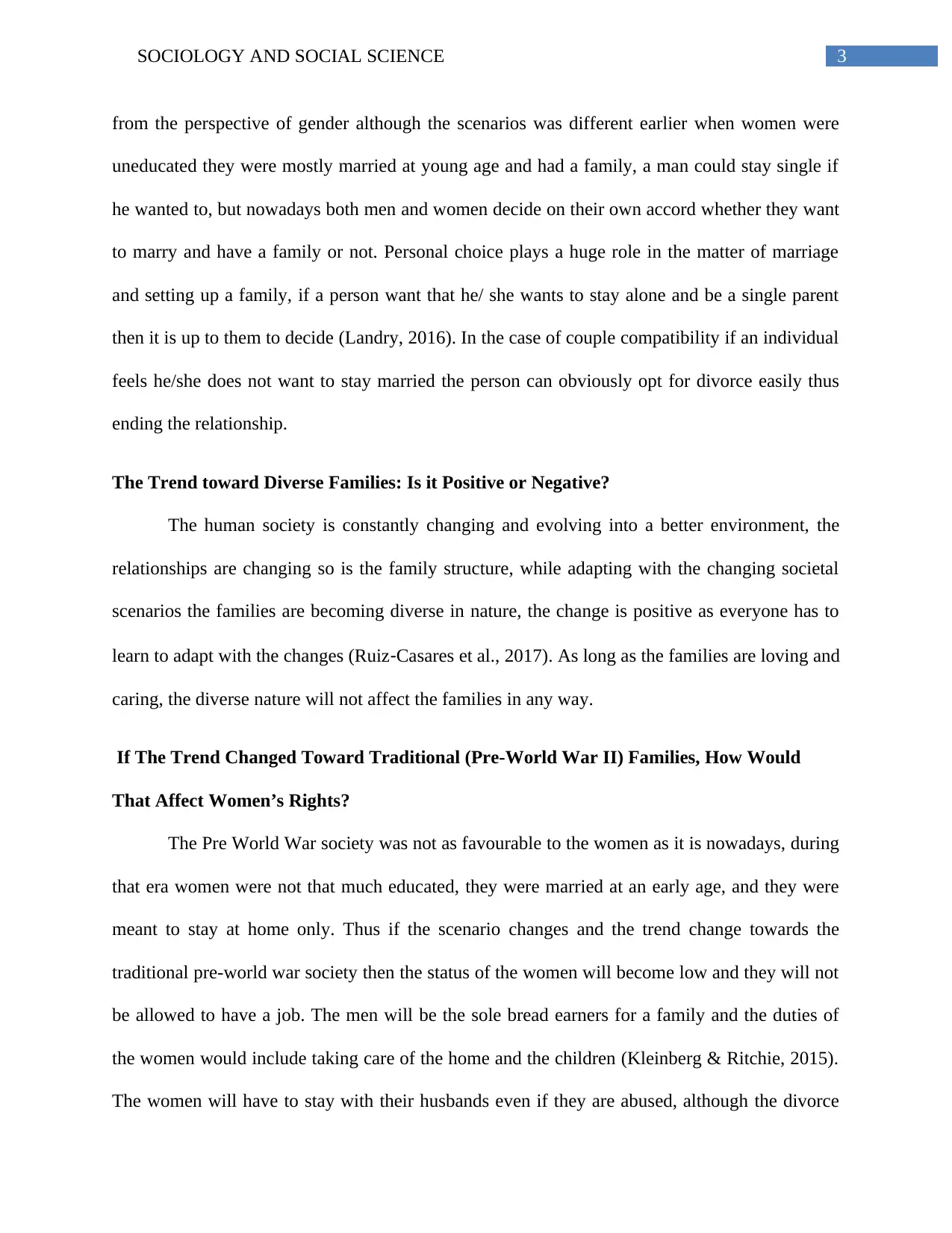
3SOCIOLOGY AND SOCIAL SCIENCE
from the perspective of gender although the scenarios was different earlier when women were
uneducated they were mostly married at young age and had a family, a man could stay single if
he wanted to, but nowadays both men and women decide on their own accord whether they want
to marry and have a family or not. Personal choice plays a huge role in the matter of marriage
and setting up a family, if a person want that he/ she wants to stay alone and be a single parent
then it is up to them to decide (Landry, 2016). In the case of couple compatibility if an individual
feels he/she does not want to stay married the person can obviously opt for divorce easily thus
ending the relationship.
The Trend toward Diverse Families: Is it Positive or Negative?
The human society is constantly changing and evolving into a better environment, the
relationships are changing so is the family structure, while adapting with the changing societal
scenarios the families are becoming diverse in nature, the change is positive as everyone has to
learn to adapt with the changes (Ruiz‐Casares et al., 2017). As long as the families are loving and
caring, the diverse nature will not affect the families in any way.
If The Trend Changed Toward Traditional (Pre-World War II) Families, How Would
That Affect Women’s Rights?
The Pre World War society was not as favourable to the women as it is nowadays, during
that era women were not that much educated, they were married at an early age, and they were
meant to stay at home only. Thus if the scenario changes and the trend change towards the
traditional pre-world war society then the status of the women will become low and they will not
be allowed to have a job. The men will be the sole bread earners for a family and the duties of
the women would include taking care of the home and the children (Kleinberg & Ritchie, 2015).
The women will have to stay with their husbands even if they are abused, although the divorce
from the perspective of gender although the scenarios was different earlier when women were
uneducated they were mostly married at young age and had a family, a man could stay single if
he wanted to, but nowadays both men and women decide on their own accord whether they want
to marry and have a family or not. Personal choice plays a huge role in the matter of marriage
and setting up a family, if a person want that he/ she wants to stay alone and be a single parent
then it is up to them to decide (Landry, 2016). In the case of couple compatibility if an individual
feels he/she does not want to stay married the person can obviously opt for divorce easily thus
ending the relationship.
The Trend toward Diverse Families: Is it Positive or Negative?
The human society is constantly changing and evolving into a better environment, the
relationships are changing so is the family structure, while adapting with the changing societal
scenarios the families are becoming diverse in nature, the change is positive as everyone has to
learn to adapt with the changes (Ruiz‐Casares et al., 2017). As long as the families are loving and
caring, the diverse nature will not affect the families in any way.
If The Trend Changed Toward Traditional (Pre-World War II) Families, How Would
That Affect Women’s Rights?
The Pre World War society was not as favourable to the women as it is nowadays, during
that era women were not that much educated, they were married at an early age, and they were
meant to stay at home only. Thus if the scenario changes and the trend change towards the
traditional pre-world war society then the status of the women will become low and they will not
be allowed to have a job. The men will be the sole bread earners for a family and the duties of
the women would include taking care of the home and the children (Kleinberg & Ritchie, 2015).
The women will have to stay with their husbands even if they are abused, although the divorce
Paraphrase This Document
Need a fresh take? Get an instant paraphrase of this document with our AI Paraphraser
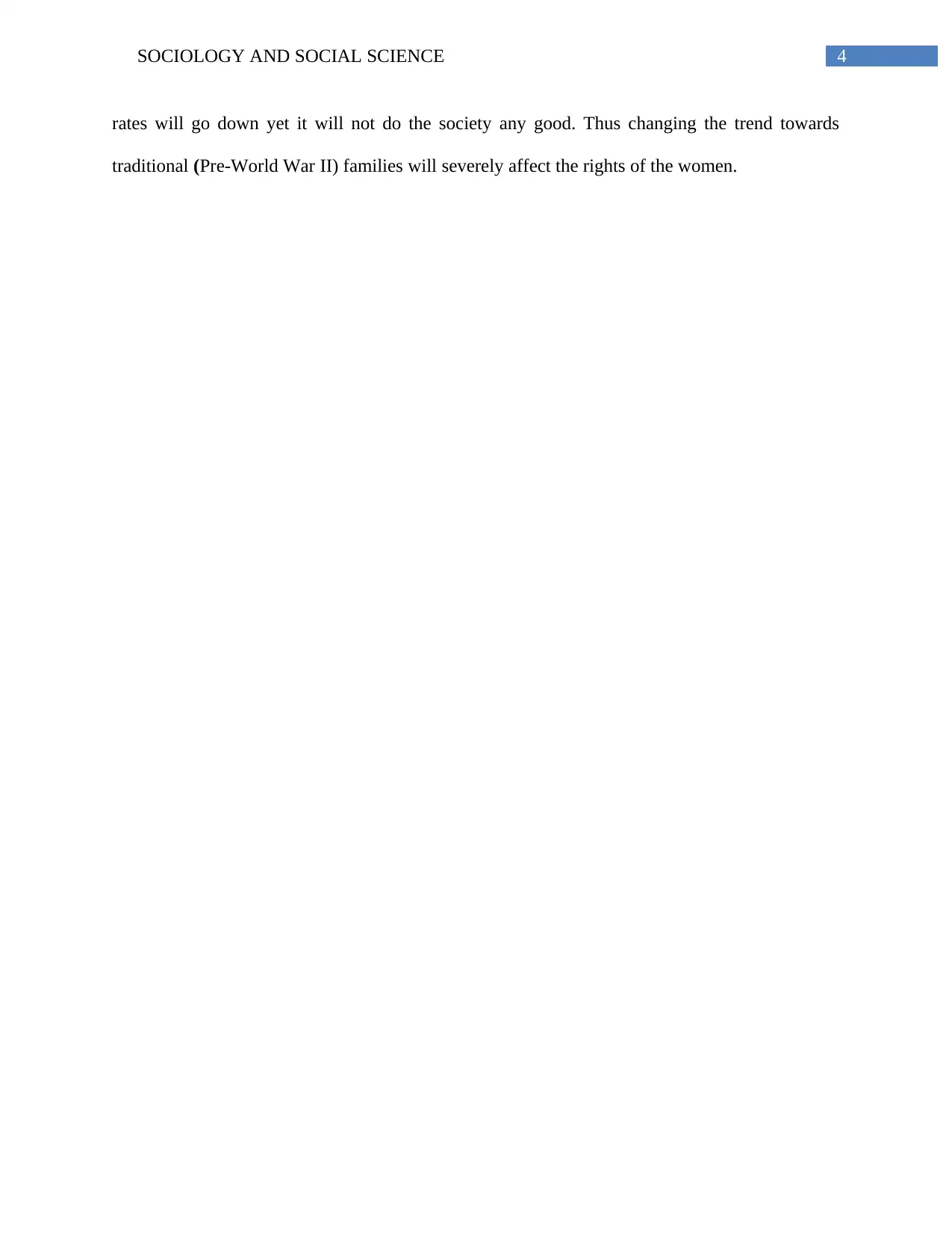
4SOCIOLOGY AND SOCIAL SCIENCE
rates will go down yet it will not do the society any good. Thus changing the trend towards
traditional (Pre-World War II) families will severely affect the rights of the women.
rates will go down yet it will not do the society any good. Thus changing the trend towards
traditional (Pre-World War II) families will severely affect the rights of the women.
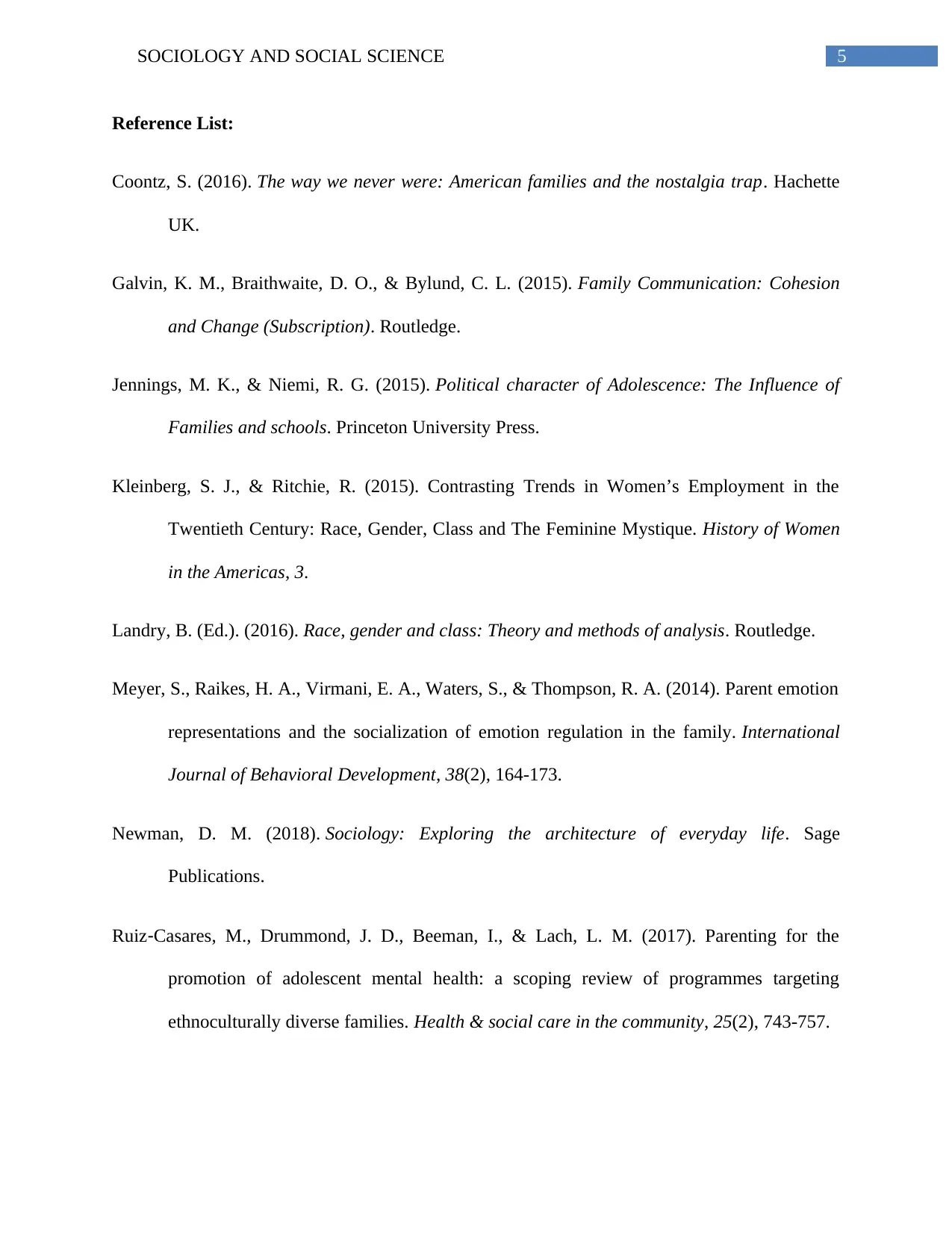
5SOCIOLOGY AND SOCIAL SCIENCE
Reference List:
Coontz, S. (2016). The way we never were: American families and the nostalgia trap. Hachette
UK.
Galvin, K. M., Braithwaite, D. O., & Bylund, C. L. (2015). Family Communication: Cohesion
and Change (Subscription). Routledge.
Jennings, M. K., & Niemi, R. G. (2015). Political character of Adolescence: The Influence of
Families and schools. Princeton University Press.
Kleinberg, S. J., & Ritchie, R. (2015). Contrasting Trends in Women’s Employment in the
Twentieth Century: Race, Gender, Class and The Feminine Mystique. History of Women
in the Americas, 3.
Landry, B. (Ed.). (2016). Race, gender and class: Theory and methods of analysis. Routledge.
Meyer, S., Raikes, H. A., Virmani, E. A., Waters, S., & Thompson, R. A. (2014). Parent emotion
representations and the socialization of emotion regulation in the family. International
Journal of Behavioral Development, 38(2), 164-173.
Newman, D. M. (2018). Sociology: Exploring the architecture of everyday life. Sage
Publications.
Ruiz‐Casares, M., Drummond, J. D., Beeman, I., & Lach, L. M. (2017). Parenting for the
promotion of adolescent mental health: a scoping review of programmes targeting
ethnoculturally diverse families. Health & social care in the community, 25(2), 743-757.
Reference List:
Coontz, S. (2016). The way we never were: American families and the nostalgia trap. Hachette
UK.
Galvin, K. M., Braithwaite, D. O., & Bylund, C. L. (2015). Family Communication: Cohesion
and Change (Subscription). Routledge.
Jennings, M. K., & Niemi, R. G. (2015). Political character of Adolescence: The Influence of
Families and schools. Princeton University Press.
Kleinberg, S. J., & Ritchie, R. (2015). Contrasting Trends in Women’s Employment in the
Twentieth Century: Race, Gender, Class and The Feminine Mystique. History of Women
in the Americas, 3.
Landry, B. (Ed.). (2016). Race, gender and class: Theory and methods of analysis. Routledge.
Meyer, S., Raikes, H. A., Virmani, E. A., Waters, S., & Thompson, R. A. (2014). Parent emotion
representations and the socialization of emotion regulation in the family. International
Journal of Behavioral Development, 38(2), 164-173.
Newman, D. M. (2018). Sociology: Exploring the architecture of everyday life. Sage
Publications.
Ruiz‐Casares, M., Drummond, J. D., Beeman, I., & Lach, L. M. (2017). Parenting for the
promotion of adolescent mental health: a scoping review of programmes targeting
ethnoculturally diverse families. Health & social care in the community, 25(2), 743-757.
⊘ This is a preview!⊘
Do you want full access?
Subscribe today to unlock all pages.

Trusted by 1+ million students worldwide
1 out of 6
Related Documents
Your All-in-One AI-Powered Toolkit for Academic Success.
+13062052269
info@desklib.com
Available 24*7 on WhatsApp / Email
![[object Object]](/_next/static/media/star-bottom.7253800d.svg)
Unlock your academic potential
Copyright © 2020–2026 A2Z Services. All Rights Reserved. Developed and managed by ZUCOL.





